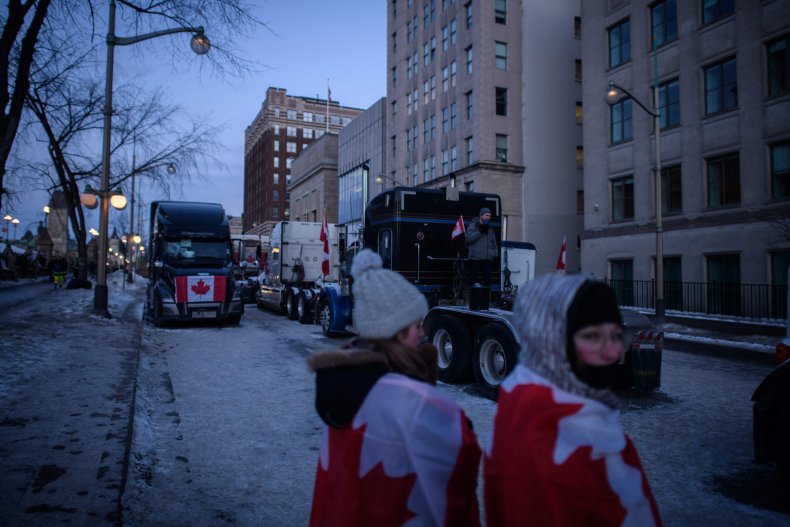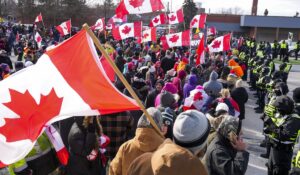Anti-COVID mandate protesters are standing their ground at the main U.S. border crossing in Alberta, even though the province has begun lifting COVID restrictions in response to the nationwide protests against Canada’s various pandemic-related mandates.
While Alberta’s Royal Canadian Mounted Police (RCMP) have made several arrests, provincial authorities are still trying to end the blockade in the community of Coutts, which is just north of Sweet Grass, Montana. It is estimated that the border crossing in Alberta sees roughly $44 million in goods pass through daily.
Ed Jones/AFP
Demonstrators opposing vaccine mandates have protested at the port of entry since January 29 and have not signaled any plans to leave despite Alberta’s attempts to roll back COVID measures, including the province’s vaccine passport program.
Last week, Alberta Premier Jason Kenney announced the province would lift its capacity limits for large gatherings and officially end its short-lived proof of vaccination program as soon as February 9. A K-12 mask mandate was previously rolled back on Monday.
Kenney added that most other COVID restrictions would be lifted by the end of the month, saying that the province has passed its Omicron peak and that “the threat of COVID-19 to public health no longer outweighs the hugely damaging impact of health restrictions on our society.”
However, despite efforts from provincial officials to begin rolling back restrictions and granting a win for the anti-mandate groups, protesters are refusing to leave the border crossing in Coutts until the federal government follows suit.
Last month, the federal government imposed a vaccine mandate on cross-border truck drivers, requiring them to be fully vaccinated in order to do their jobs. Trade groups have estimated the new requirement would affect 10 to 15 percent of the workforce.
While the mandate has faced backlash from many truckers, some of their vaccinated colleagues have become frustrated with the demonstrations, which have caused massive delays for those trying to complete their routes.
“I’m running out of the fuel in my trailer. I’m worrying about that. I’m carrying produce from Sacramento, California, to Calgary. Pretty much almost 40 hours right now. I crossed the border on Saturday. I’m over 40 hours right now here. I’m stuck just across the border,” driver Luis Restrepo told Global News when the protests began.
On Monday, the Alberta RCMP announced that they made 11 arrests and seized dozens of firearms and ammunition after becoming aware of “a small organized group within the larger Coutts protest.” The force said it is still working to end the larger blockade.
Speaking at an event in Calgary that day, Kenney said, “Now that the RCMP has successfully resolved this potential threat, they will proceed, I’m informed, with enforcement against others who are involved in the blockade.”
The two-week disruption at the border prompted the Canadian Border Services Agency to temporarily suspend services over the weekend. Previously, services remained opened with intermittent closures.
On Monday, the premier told members of the press that he asked Prime Minster Justin Trudeau to avoid invoking the never-before-used Emergencies Act to address the protests across the country, saying additional federal powers would be “not necessary, at least for an Alberta context.”
“We have all of the necessary statutory powers and operational capacity for enforcement now that we’ve resolved, now that the RCMP has resolved, the militant cell, which could potentially resulted in violence,” Kenney said. “And so we have now obtained the necessary equipment and we have very strong laws in Alberta already.”



















